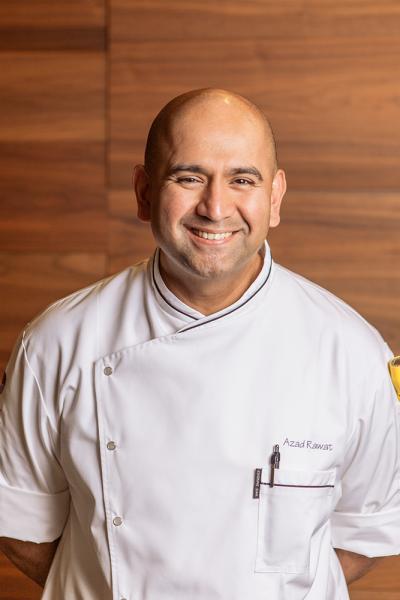When Azad Rawat joined the team at the Hyatt Regency Lake Washington in Renton, Wash., as executive chef in April, the position was an opportunity to show off a lifetime of culinary education—and years of finding the best partners in the region.
Rawat’s interest in cooking stems from his childhood in northern India, where he estimates that half of his family was in the military and the other half was involved in cooking. Enticed by the latter half, he started out working for some smaller restaurants as a dishwasher—a necessity for getting a foot in the door to the industry, he explained: “If you don't have any experience, nobody hires you.”
After learning the basics, Rawat took advantage of his father’s job with Air India to travel the world and learn more about Asian cuisine in Singapore, Bangkok and Hong Kong. “I got more exposure to more of the technicalities of the food,” he recalled of those years. With that experience under his belt, he traveled to Dubai in the United Arab Emirates to continue his education. Over the course of three years at the JW Marriott property in Dubai, he worked in seven different restaurants, learning about everything from intimate steakhouses to pan-European cuisine to serving thousands at a banquet.

Interested in management opportunities, Rawat learned of the J1 exchange visitor visa program that would allow him come to the U.S. The Marriott team in Dubai sponsored him and he arrived at the Seattle Marriott Redmond in Redmond, Wash., in 2008 as a chef de partie. At the hotel, he learned about different facets of managing a restaurant, from handling labor challenges to employee training, food costs, development and even grooming standards.
Northwestern Fare
Now married and with a family, Rawat wanted to remain in Washington as he advanced his career—and the region reminded him of his hometown in Northern India. “You have the same terrain, same mountain, same river—the only difference is the rain,” he said. He worked at Marriott hotels in the state through 2012 before joining the Red Lion Hotel (now the Motif Seattle) as a banquet chef, handling large-scale meals for anywhere between 50 to 2,500 people and overseeing both menu planning and development. Less than a year later, he joined the Hotel 1000 Seattle in the same position. “[I] gained more exposure to fine products, fine quality food, and then cohesively, cooperatively [worked] with the local suppliers—local meat program, local cheese program—building the relationships which can help me to develop my menu,” he said. In positions at the Snoqualmie Casino in Snoqualmie, Wash., and the Seattle Airport Marriott, he learned how to adapt to different expectations from guests. As executive chef at the Hyatt Regency Seattle, he prepared dishes for corporate clients, while the Hyatt Regency in Lake Washington has more of a family-friendly, leisure-focused vibe. A wide range of experience, he noted, helps a chef be more creative when developing menus.
Rawat joined the Lake Washington Hyatt Regency property as executive chef in April, eager to continue sourcing ingredients from local farmers and put his experience to good use in a different environment. “You have a lot of local seafood [that] comes in summer, and then Eastern Washington flourishes with a lot of nice stone fruit, dried fruits [and] grains," he said. "There is this abundance of products seasonally to be cooked here.” Rawat sources chicken from Mad Hatcher Poultry, where he said the quality of the chicken can be compared to legacy farmers in France. Snake River Farm supplies wagyu beef while Salmon Creek Farms “does a really good Berkshire style of pork.”
Ultimately, he said, the most important thing for a chef to do is respect the food they work with. “You don't need to add or mix a lot into the ingredients. If you respect the product and get them seasonally done, the product itself is gonna speak—if you take care and cook it right.”
Azad Rawat’s…
Biggest Challenge
Traveling the world gave Rawat a sense for different cuisines, but getting a sense for the ingredients was a bit of a learning curve. Specifically, his diet in India was largely vegetarian, but his positions in America required learning extensively about different types of meats and how to determine their quality.
Solution
“I did not want to do just Indian cuisine … I want[ed] to explore, and my goal was to gain all the experience. When I make any menu, [I want to] show my experience and do the techniques I have learned over the past year and bring that to the table where it will be just enhanced and the guests will be surprised to see how the flavors are mixed.”
Advice to Chefs
“You need to have a passion and a goal and [know] how you're going to reach [it]. Create that ladder [and] create those steps. … There will be failure but take the failure as a learning curve, which will definitely enhance you to be better in the future.”
3 Keys to Success
Be Passionate: “Enjoy your work and give more love and understanding towards it. … The appreciation and the love that you get from the customer [will help] you to enhance more, to grow further.”
Be Humble: “I treat everyone with the same respect and try to understand and be in their shoes.”
Lead by Example: “There will be challenges for some individuals, but [think] about how to develop them, and what can they work on better.”
Hyatt Regency Lake Washington
Opening Date: 2017 | Rooms: 347 | Owner: Seco Development | Operator: Hyatt Hotels Corp.
